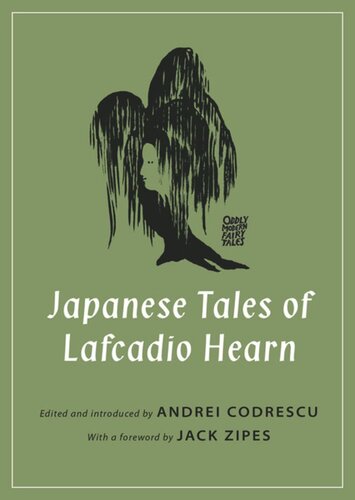

Most ebook files are in PDF format, so you can easily read them using various software such as Foxit Reader or directly on the Google Chrome browser.
Some ebook files are released by publishers in other formats such as .awz, .mobi, .epub, .fb2, etc. You may need to install specific software to read these formats on mobile/PC, such as Calibre.
Please read the tutorial at this link: https://ebookbell.com/faq
We offer FREE conversion to the popular formats you request; however, this may take some time. Therefore, right after payment, please email us, and we will try to provide the service as quickly as possible.
For some exceptional file formats or broken links (if any), please refrain from opening any disputes. Instead, email us first, and we will try to assist within a maximum of 6 hours.
EbookBell Team

4.8
74 reviewsA collection of twenty-eight weird and wonderful stories by the writer Lafcadio Hearn (1850-1904), inspired by Japanese folk tales and introduced by Andrei Codrescu
A collection of twenty-eight brilliant and strange stories, inspired by Japanese folk tales and written by renowned Western expatriate Lafcadio Hearn
Lafcadio Hearn (1850–1904) was one of the nineteenth century’s best-known writers, his name celebrated alongside those of Mark Twain and Robert Louis Stevenson. Born in Greece and raised in Ireland, Hearn was a true prodigy and world traveler. He worked as a reporter in Cincinnati, New Orleans, and the West Indies before heading to Japan in 1890 on a commission from Harper’s. There, he married a Japanese woman from a samurai family, changed his name to Koizumi Yakumo, and became a Japanese subject. An avid collector of traditional Japanese tales, legends, and myths, Hearn taught literature and wrote his own tales for both Japanese and Western audiences. Japanese Tales of Lafcadio Hearn brings together twenty-eight of Hearn’s strangest and most entertaining stories in one elegant volume.
Hearn’s tales span a variety of genres. Many are fantastical ghost stories, such as “The Corpse-Rider,” in which a man foils the attempts of his former wife’s ghost to haunt him. Some are love stories in which the beloved is not what she appears to be: in “The Story of Aoyagi,” a young samurai narrowly escapes the wrath of his lord for marrying without permission, only to discover that his wife is the spirit of a willow tree. Throughout this collection, Hearn’s reverence for Japan shines through, and his stories provide insights into the country’s artistic and cultural heritage.
With an introduction by Andrei Codrescu discussing Hearn’s life and work, as well as a foreword by Jack Zipes, Japanese Tales of Lafcadio Hearn provides a unique window into one writer’s multicultural literary journey.